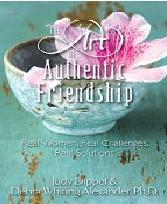 By Oregon author Judy Dippel
By Oregon author Judy Dippel
Book: The Art of Authentic Friendship: Real Women, Real Challenges, Real Solutions
“Now that I know something is wrong between us, I’m more than stunned. I can’t say this to you partly because I can’t seem to put words on the agonizing emotions that are churning, but I guess this sums it up: I feel like I’ve been fired as your soul mate.”
Sally, age 51
The loss of a friend is a harsh reality; it hurts. When the ties of a connected and valuable friendship are severed even temporarily, the results can be devastating. Emotional anguish between friends can spring from hurtful actions or circumstances. It can be complicated, confusing, and challenging. When someone gets “burned” or feels rejected, bitterness and resentment threaten to extinguish even the best of relationships.
Sometimes walking away from a friendship is the only course of action that can be taken. You may need to fondly remember the good times and move forward. However, when a problem exists with a cherished friend, it is worth every effort to strive to reconcile the problem. The challenges presented within friendships provide opportunities for change and growth when they are faced candidly and honestly. Regardless of the outcome, one thing is certain—anguish and hurt will not go away until you do something about it.
One common cause of hurt is a sudden change in words and actions towards you—passive distancing, or feeling ignored and passed over. Other painful situations include outright betrayal or pressure stemming from unrealistic expectations and competitiveness. Uncomfortable feelings of envy or jealousy also contaminate relationships.
A number of factors can influence the way you respond to hurt and conflict in friendships. First, it is important to remember, that even between two close friends, the perspective of the problem is likely very different. Why?
Each of you is a unique individual. Upbringing and relationship history set the stage for how each of you tends to react to problems. Personality traits and expectations also influence the degree of anguish that is felt and experienced in difficult situations. Regardless, most women say the confusion from a sudden change in attitude or hostility can cause great suffering. The distress can quickly put a friendship on trial, testing its limits.
Sally words may echo your feelings today. “How does this happen to two friends who love each other and have been through decades of life together? I keep thinking ‘I’m a mature woman, get a grip.’ I keep grasping for who you’ve always been to me, but you’re not acting the same towards me. What’s the problem? Each time I struggle to make sense of the rejection I feel from you I’m filled with absolute shock and disbelief all over again. I wonder if it will ever be straightened out. I haven’t experienced a divorce, but it must feel something like this.”
Don’t be surprised when your hurt takes you through the complete process of grief—shock, denial, anger, sadness acceptance…and finally, growth. There is good news in this process! As you seek God in a hurtful situation, and allow His perspective to become yours, love and forgiveness will begin to replace hurt, anger and sadness. Through God, you can survive and thrive, as you find the strength and courage to make healthy choices.
Start by considering frank, positive confrontation with your friend. It may create anxiety, and is not always pain-free or comfortable, but it is a constructive way to appeal to your friend in faith, hope and love, as the Apostle Paul instructs. (I Cor.13)
“The Art of Confrontation”…what you can do:
• First, pray and give thanks for your friend. Ask for a “clean heart” towards her.
• Be clear about your feelings, motivations, and purpose.
• Pick a convenient, undistracted time and place that suits both of you.
• Commit to an honest discussion and agree to stay on track.
• Use statements that begin with “I…,” instead of “You…” “I” statements minimize defensiveness and language that may sound or feel attacking.
• Be willing to listen to one another’s needs and perspectives without interruption.
• Repeat back to your friend what you hear them saying and vice versa. Check the accuracy of what you heard.
• Go back and clarify with one another any areas you want or need further understanding. Again, take turns doing this and do not interrupt one another as each clarifies information and feelings further.
• Admit your part in the problem.
• Confront the problem, not your friend.
• Be sincere and honest.
• Speak first-hand knowledge; use specific examples and stick to the facts.
• Remind yourself that you cannot change other people, but you can change yourself. You don’t have to prove yourself right. Instead, you can agree to disagree.
• Sometimes it’s best to focus on reconciliation of the relationship rather than resolution of the problem. It’s great to have both when you can but if that’s not possible, make it a goal to put the well-being of your relationship first.
• Remember, reconciliation is a mutual process. It’s not always a fifty-fifty proposition the whole way through but it’s something that needs to be faced together every step of the way.
Lastly, please remember that it is God’s desire to comfort you. As written in Hebrews 4:16: (NAS) “…let us draw near with confidence to the throne of grace, so that we may receive mercy and find grace to help in time of need.”
Disclaimer: Articles featured on Oregon Report are the creation, responsibility and opinion of the authoring individual or organization which is featured at the top of every article.


